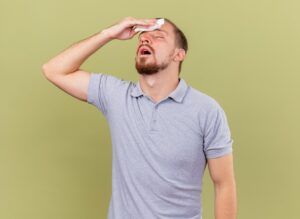Dehydration: What is it? Symptoms, Causes, and Prevention

When your body loses more fluids than it takes in, it becomes dehydrated, which impairs vital processes like digestion, joint lubrication, and temperature regulation. It may be brought on by dehydration, excessive perspiration, diarrhea, vomiting, or disease. Muscle cramps, dark urine, exhaustion, dizziness, and dry mouth are typical symptoms. Severe dehydration necessitates prompt medical attention because it can cause disorientation, a fast heartbeat, or fainting. The elderly, children, and people with long-term illnesses are more vulnerable. Drink lots of water to avoid dehydration, especially when exercising or in hot weather. Maintaining proper hydration keeps your body functioning and promotes general health.
What Leads to Dehydration?
Although anyone can become dehydrated, it is particularly common during hot weather, when ill, or after vigorous physical activity. Typical reasons include:
1. Not getting enough water
2. Sweating excessively (during exercise or in hot weather, for example)
3. Diarrhea or vomiting
4. A fever
5. Drugs called diuretics (which increase urine production)
6. Chronic conditions such as kidney disease or diabetes
Dehydration Signs and Symptoms
Depending on the amount of fluid lost, symptoms can vary from mild to severe.
Dehydration that is mild to moderate:
1. Dry throat and mouth
2. A headache
3. Weariness or lightheadedness
4. Urine that is dark yellow
5. Dry skin
6. cramping in the muscles
7. A rise in thirst
Severe dehydration (a medical emergency):
1. Fast heartbeat
2. Breathing quickly
3. Sunken eyes or extremely dry skin
4. Perplexity or agitation
5. Passing out
6. Absence of urine for more than eight hours
Who Is Most in Danger?
1. Young children and infants (who lose fluids more quickly)
2. Elderly people (less thirst awareness)
3. Individuals who suffer from long-term illnesses
4. Outdoor workers or athletes
5. People who reside in hot, muggy climates
✅ How to Avoid Dehydration
If you take a few crucial actions, staying hydrated is easy:
1. Aim for 8 to 10 glasses of water or more if you’re an active person.
2. Drink more water when it’s hot outside, you’re exercising, or you’re sick.
3. Consume foods high in water, such as lettuce, oranges, cucumbers, and watermelon.
4. Avoid sugary drinks, caffeine, and alcohol, as they can cause fluid loss.
5. If you have diarrhea or vomiting, use oral rehydration solutions (ORS).
How to Handle Dehydration
Mild dehydration:
1. Drink water gradually.
2. Make use of ORS or electrolyte drinks.
3. Take a nap in a cool, shaded spot.
4. Get medical assistance right away.
5. In a hospital, IV fluids might be necessary.
Easy Ways to Drink Water
1. Keep a bottle of water with you.
2. Put water-drinking reminders on your phone.
3. If you don’t like the taste of water, add lemon or mint.
4. Monitor the color of your urine; light yellow is best.
5. Drink before, during, and following physical activity.
Final Thoughts
Dehydration is often misunderstood as simply “feeling thirsty,” but it is far more serious than that. While thirst is one of the early warning signs, dehydration can occur long before you feel parched. Your body depends on water for almost every function—regulating temperature, aiding digestion, cushioning joints, carrying nutrients, and removing waste. When you lose more fluids than you take in, these vital processes start to slow down or even fail, which can have a major negative impact on your overall health.
Ignoring the signs of dehydration can lead to more than just discomfort. Mild dehydration can cause headaches, fatigue, dizziness, and difficulty concentrating. Over time, even low-level dehydration can reduce your energy, impair your mood, and affect physical performance. In severe cases, dehydration can lead to heat exhaustion, kidney problems, and in extreme situations, life-threatening complications. This is why it is important to treat hydration not as an afterthought but as an essential part of your daily routine.
Maintaining proper hydration is simpler than many people think. One of the easiest and most efficient ways to take care of your body is to consistently drink enough water throughout the day. This doesn’t mean forcing yourself to gulp down liters at once—rather, it’s about steady, regular intake. Listen to your body’s cues: dry mouth, dark-colored urine, tiredness, and even irritability can be signals that your body needs more fluids. Beyond plain water, foods like cucumbers, oranges, watermelon, and leafy greens can also contribute to your hydration levels. Herbal teas, fresh fruit juices, and coconut water are other healthy options to keep your fluid intake varied and enjoyable.
It’s worth noting that your hydration needs may change depending on your activity level, climate, and health conditions. For instance, if you exercise regularly or live in a hot, humid environment, your body loses fluids more quickly through sweat. In such cases, you should increase your water intake accordingly. Similarly, if you are ill or experiencing fever, vomiting, or diarrhea, your fluid needs may rise significantly. Paying attention to these changes and adapting your hydration habits is a smart and proactive way to protect your health.
The benefits of staying hydrated go beyond just preventing dehydration. When you drink enough water, you support better digestion, improve skin health, maintain joint flexibility, and promote a healthy metabolism. Hydration also plays a key role in brain function—helping you stay alert, focused, and mentally sharp. Even slight dehydration can make it harder to think clearly, so staying hydrated is as important for your mind as it is for your body.